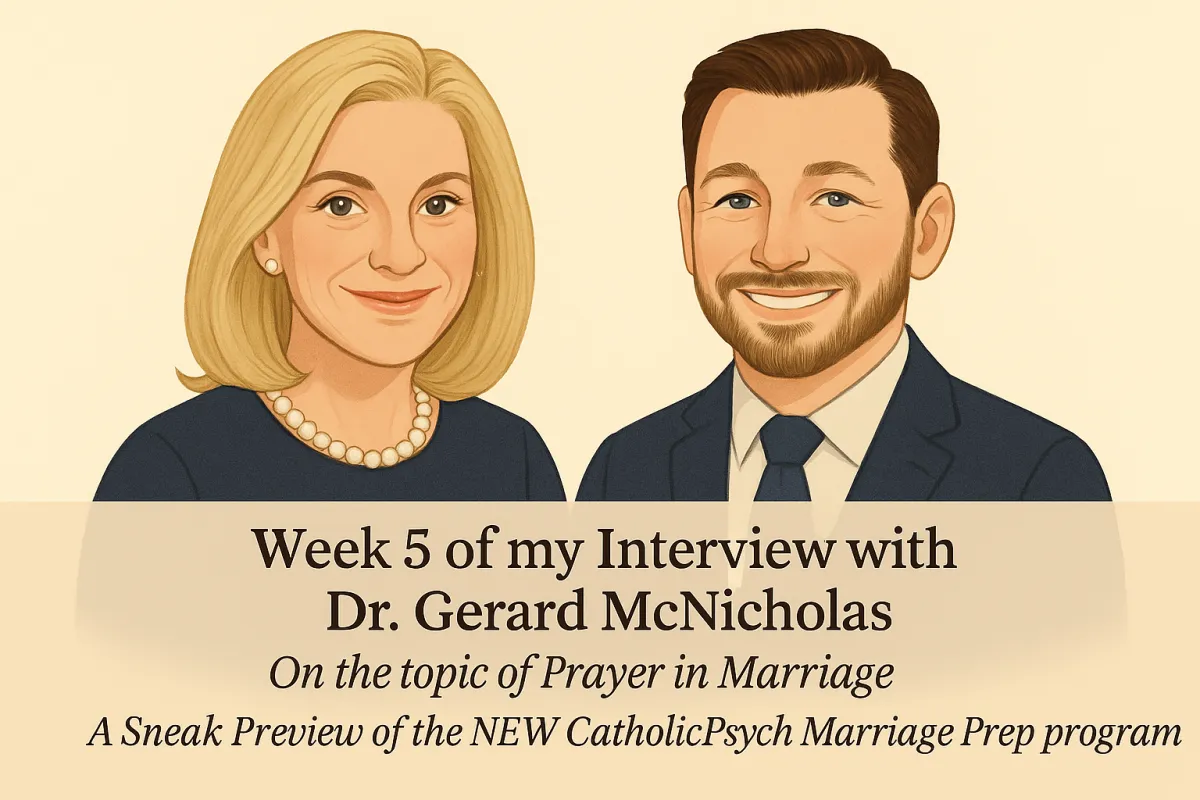
Prayer in Marriage – The Grace That Sustains Love
Prayer in Marriage: The Grace That Sustains Love
A dialogue through a psychological lens with Dr. Gerard McNicholas
Week 5 of an eight-week series from the CatholicPsych Marriage Prep Program, Gift: A Marriage Built to Last
About the Series
Conversations with Dr. Gerard McNicholas is an eight-week dialogue exploring the integration of Catholic theology and modern psychology.Together, we invite couples and individuals to see marriage not only as a vocation of love but as a path of healing, virtue, and holiness.
Each reflection draws from our work in the CatholicPsych Marriage Prep Program, Gift: A Marriage Built to Last.
The Heartbeat of a Catholic Marriage
Prayer is the heartbeat of a Catholic marriage.
Just as oxygen sustains the body, prayer sustains love.
It anchors the couple in God and reminds them that marriage cannot be lived by human strength alone.
While romance and communication are essential, without prayer, marriage risks becoming self-reliant.
With prayer, spouses open themselves to grace, forgiveness, and a deeper intimacy that only God can give.
Prayer forms the spiritual backbone of a strong and healthy marriage.
When couples pray together, they enter into a sacred exchange of giving and receiving, deepening their relationship with one another and with God.
This spiritual intimacy allows them to share their hearts, even their “spiritual tremors,” and to foster a deeper union in their shared journey toward holiness, inviting God’s grace into the everyday moments of marriage.
Prayer as Lifeline
In the Sacrament of Marriage, Christ is not a distant witness but an active participant.
Couples who pray together keep Him at the center.
Prayer need not be elaborate: a morning blessing, Sunday Mass, or a whispered thank you before bed.
These small acts form a rhythm of turning toward God, especially in times of stress or conflict.
The foundation of prayer in marriage begins with both individual and shared prayer.
Personal prayer nurtures each spouse’s relationship with God, while shared prayer unites them as one before Him.
The sacraments, especially the Eucharist and Confession, sustain this life of prayer.
In the Eucharist, couples encounter the perfect model of self-giving love as Christ offers Himself to the Church, mirroring the total gift spouses are called to make to one another.
Confession restores grace and forgiveness, helping spouses grow in mercy and humility.
Attending Mass together, receiving the Eucharist, and encouraging one another to go to Confession fortify the spiritual foundation of marriage.
Vulnerability and Intimacy
Prayer requires vulnerability.
To pray together is to stand before God with open hearts, to reveal hopes, fears, and faults in the light of grace.
This openness deepens trust, tenderness, and forgiveness.
Couples who pray together often communicate with greater gentleness and empathy because they are united not only by vows but by grace itself.
As prayer deepens, reverence and respect become crucial.
Sharing personal struggles can feel intimidating, so spouses should approach prayer with gentleness, avoiding criticism or correction during this sacred time.
Beginning with gratitude before exploring more vulnerable emotions helps trust to grow.
Afterward, discussing insights or feelings ensures that prayer remains a source of connection and healing.
The Examen Prayer for Couples
A simple yet powerful practice is the Daily Examen, first taught by St. Ignatius of Loyola and easily adapted for married life.
Together, couples pause to reflect on the day, not to judge, but to notice how God has been at work in and between them.
The Examen unfolds in five gentle steps:
The Examen unfolds in five gentle steps:
• Invite God’s presence.
Take a moment of stillness and ask the Holy Spirit to open your hearts and shed light on your day.
• Give thanks.
Recall the blessings of the day, both ordinary and unexpected, and thank God for His goodness.
• Review the day together.
Share the moments that stood out: where you felt close or distant, peaceful or tense.
Notice how God was present in your joys and struggles.
• Ask forgiveness.
Humbly acknowledge where you fell short in love, patience, or kindness, and receive God’s mercy and one another’s compassion.
• Look toward tomorrow.End by asking God for the grace you need for the next day.Choose one simple way to respond to His love more fully.
Couples can take turns praying aloud while the other listens with empathy and care.This practice fosters gratitude, humility, and tenderness, daily habits that strengthen both love and holiness.
·In
A Conversation with Dr. Gerard
Kristin: In this session we talk about prayer as the lifeline of marriage.
From your perspective, what difference does it make when couples actually pray together?
Dr. Gerard: It can make all the difference.
When couples pray, they slow down, align their focus, and risk being vulnerable.
That act of opening the heart before God and each other deepens connection.
And the research is clear: couples who share spiritual practices report greater satisfaction, more resilience during stress, and deeper intimacy.
Psychologically, prayer works much like emotional regulation, helping couples manage stress and stay connected, but with the added grace of God shaping the bond.
Kristin: That’s really encouraging.
But I know a lot of couples feel nervous about praying together or think they have to do it perfectly.
What would you say to them?
Dr. Gerard: Start small and keep it simple.
It’s about forming habits, and habits form shared virtue.
A short blessing to begin or end the day, one line of gratitude at the dinner table, even sitting quietly together for a few minutes after Mass.
Just as the consistent little moments of turning toward each other build emotional security, those small moments of prayer build spiritual security.
It’s less about length or polish and more about presence and heart.
The Grace That Sustains Love
Prayer in marriage is not merely a devotional act; it is a lifeline.
It invites God into the relationship, cultivates vulnerability and intimacy, and creates a steady rhythm of gratitude and forgiveness.
Theology calls it grace; psychology calls it attunement.
Both affirm that prayer is one of the most powerful ways a couple can stay united in love.
It took many years for Rob and me to mature spiritually.
In the beginning, praying together felt awkward.
But over time, starting simply with mealtime prayer, a decade of the Rosary, and attending Mass together regularly, it became something deeply attractive and unifying.
Gradually, we began praying the full Rosary, sharing the Examen, and from time to time praying a Divine Mercy Chaplet, a 54-day Novena to Our Lady, or a spontaneous shared mental prayer or petition.
There is no perfect formula or checklist for marriage.
Prayer is deeply personal, between you, your spouse, and God, and it grows as love matures.
If you have never developed a structured prayer life, start now.
Like every dimension of marriage, it is a work in progress, but if you do not move forward, you will drift backward.
Prayer keeps the couple growing together in God, day by day, season by season.
Reflect and Respond
Take a quiet moment today to pray together, even a simple thank you or a few seconds of silence.
Let it be an act of turning toward God and one another, trusting that He will sustain your love in every season.


